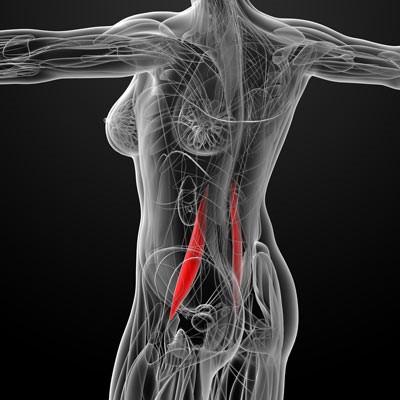Happy psoas, happy life

By Eliza Nimon; Certified Pilates/Barre Instructor
www.empoweredlivingwitheliza.com
The direct correlation between your psoas muscle and your health.
We’ve all heard the term “fight or flight response” before, but are you aware there is a muscle in your body that correlates directly with this emotional, animalistic desire for survival? This muscle is your psoas and in certain spiritual philosophies it’s referred to as the “muscle of the soul” because it acts as the messenger of the nervous system and can deeply affect how we feel about ourselves, our lives and our relationships. In the rapid fire, fast-paced world we live in today, there may be no better way to care for your overall health than to listen to and care for your psoas muscles.
In Pilates, I teach my clients how to move and support their bodies’ efforts from the core center. Structurally speaking, your psoas muscles are the deepest muscles in your core. They attach from your 12th thoracic vertebra to your 5th lumbar vertebra, through your pelvis and then finally attach to the head of your thigh bones. This makes them vitally important for all types of movement, as they are the only muscles that connect your spine to your legs. Your psoas muscles allow you to lift your knees as you walk upstairs, to bend forward to pick up your child, to walk, run, dance–in short, every movement you make each day relies on your psoas muscles. In addition, the psoas muscles create a sling of support for your internal organs and work like hydraulic pumps allowing blood and lymph to be pushed in and out of your cells. Is there anything these muscles don’t do, you might be asking? Well, let’s take this a step further and talk about the relationship of the psoas to our psychological health.
In addition to your physical well-being, the psoas is directly related to your sense of psychological well-being because of their connection to your diaphragm and therefore, your breath! The two tendons of your diaphragm connect to the spine alongside where the psoas muscles attach. They are also connected through fascia that also connects the other hip muscles. These physical attachments between the psoas muscle and the diaphragm literally connect your ability to walk and breathe, and also how you respond to fear, excitement, joy or anxiety. That’s because, when you are startled or under stress, your psoas contracts. In other words, your psoas has a direct influence on your fight or flight response!
Three signs of imbalanced psoas
- Knee or low back pain
If you experience knee or low back pain with no apparent cause, it may be coming from your psoas muscles. When the thigh bone is “locked” into your hip socket due to a tight psoas muscle, you’re not able to properly rotate the joint and this can cause inflammation and mysterious discomfort which manifests in your knees, low back or front of the hips.
- Leg length discrepancy
A tight psoas muscle can cause your pelvis to rotate forward. You might think this uncommon or strange, but in fact, as a Pilates instructor I see this quite a lot! Because of this rotation in the pelvis, the affected leg can begin to internally rotate. Because the body is always striving for balance, the opposite leg will often rotate externally in an effort to counter balance. This will make the affected leg “longer” and each time you take a step, it drives your leg up into your hip socket, which can lead to pain, inflammation, misalignment in the pelvis, hips and legs.
- Feel exhausted or depleted (this one is MAJOR!)
Your psoas muscles create a muscular shelf that your kidneys and adrenals rest on (crazy but true). As you breathe properly your diaphragm moves and your psoas muscles gently massage these organs, stimulating blood circulation. But when the psoas muscles become imbalanced, so do your kidneys and adrenal glands, causing physical and emotional exhaustion. In fact, according to Liz Koch, author of The Psoas Book, “The psoas is so intimately involved in such basic physical and emotional reactions, that a chronically tightened psoas continually signals your body that you’re in danger, eventually exhausting the adrenal glands and depleting the immune system.”
3 tips for healthier, happier psoas muscles (and more freedom and joy in your life!)
- Avoid sitting for long periods of time
If you must sit for work or other reasons, sit with good posture with your shoulders stacked on top of your hips; hips should feel level. Try getting up to walk about every hour, and while at your desk try gently arching and rounding the low back to release the psoas and muscles of low back.
- Vary your workouts (Balans has you covered in this department!)
If you tend to only run, power walk or lift weights, remember muscles need variety to be healthy and happy! Plus, trying new things (despite how we often resist this concept) is actually proven to increase happiness as new activities stimulate the brain and makes us feel more excited about our lives. Try adding Pilates or yoga into your mix to build strength, enhance body awareness and stretch and soothe away tension on a regular basis so it doesn’t get locked away in your psoas muscles.
- Release stress regularly; practice forgiveness and let go of past traumas
This seems simple enough, eh? But forgiveness and moving through our individual pain and trauma can be physically and mentally challenging. Seek out a counselor if you need, take a long walk in nature, practice gratitude meditation each day for 5-10 minutes or like I do, try asking yourself each morning, “if I could do one thing today that would make me genuinely happy, what would it be?” We are truly powerful beings who can create what we want and to get what we need when we set aside a few moments each day to contemplate, breathe deeply and regain our clarity.
For more information on all of the above, to set up a Pilates session or to simply learn more about how Balans can assist you on your journey to health, please email me at eliza@bostonbalans.com. Here’s to a healthy, happy and abundant fall season!

